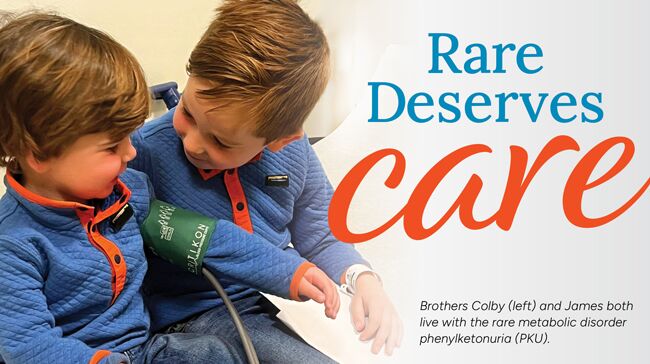Patients at the Forefront
At the 2024 National Organization for Rare Disorders (NORD) Rare Diseases and Orphan Products Breakthrough Summit®, more than 800 attendees – patient advocates, industry leaders, regulators, and other community members – shared a common commitment: ensure innovative therapies reach all patients who need them.
The event kicked off on Oct. 21st with NORD Chief Executive Officer Pam Gavin introducing this year’s Summit theme, “Equitable Access to Innovation.” A cornerstone of NORD’s mission, this theme was woven throughout the event to reiterate the importance of access to care and treatments. Gavin went on to announce two key patient-centered NORD initiatives:
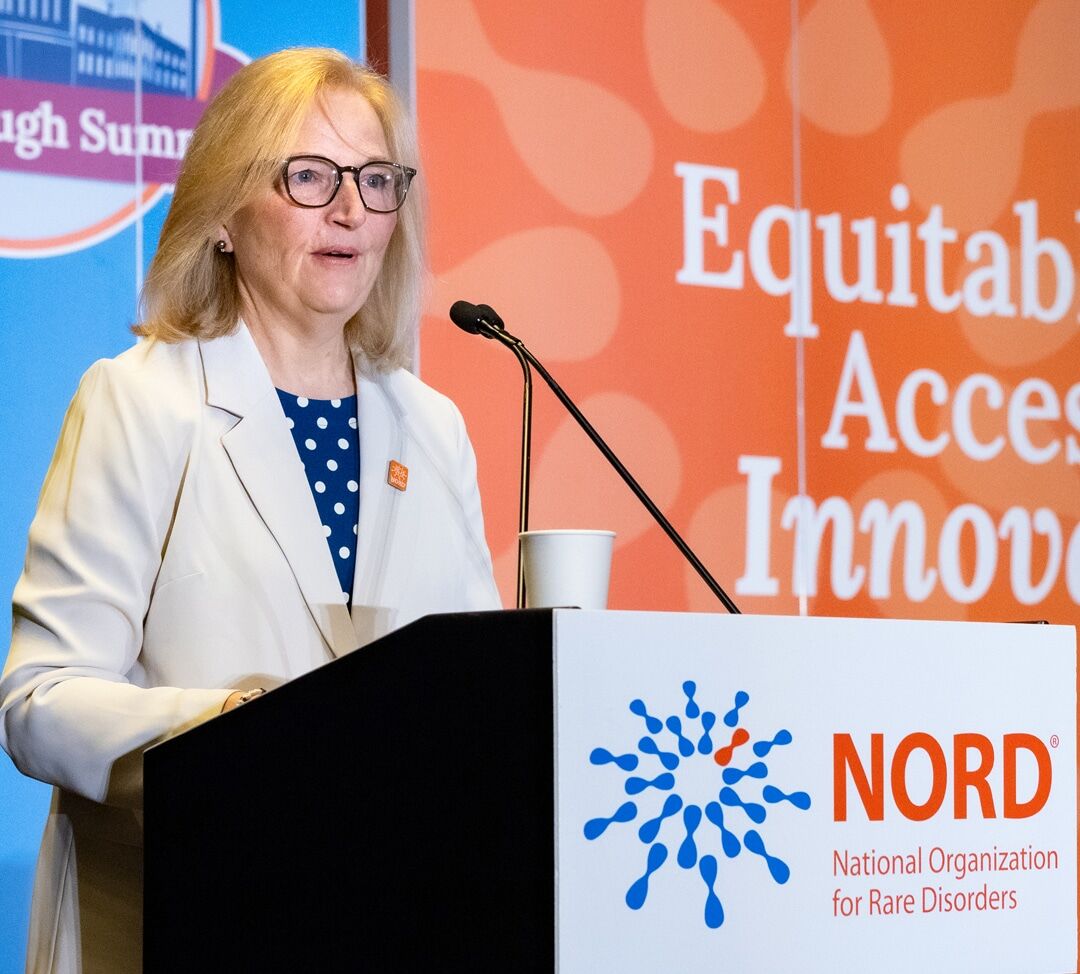
- The complete Rare Disease Drug Development Series is now available for patients, caregivers, and advocates interested in helping advance new therapies for their disease. Developed by NORD with the FDA and Critical Path Institute, this free, online course simplifies the drug development process, equipping participants with information they need to contribute and collaborate effectively.
- NORD announced the Living Rare Study, a multi-year research project – the first of its kind in the U.S. – which aims to investigate how patients and caregivers navigate healthcare, daily life and emotional wellbeing while living with a rare disease. To learn more, including how to participate, click here.
Keynote Speakers
Pam introduced three trailblazing keynote speakers, who’s stories and advocacy exemplify the urgency and impact of this year’s theme: Equitable Access to Innovation.
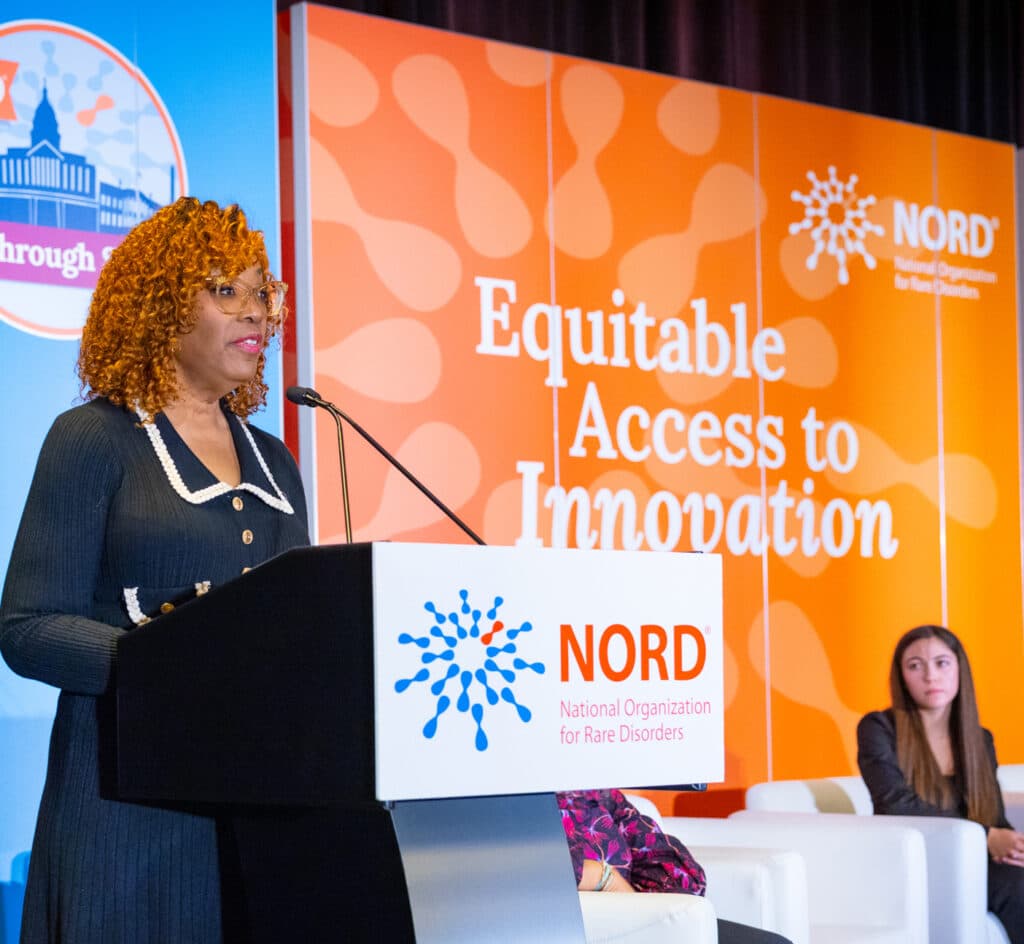
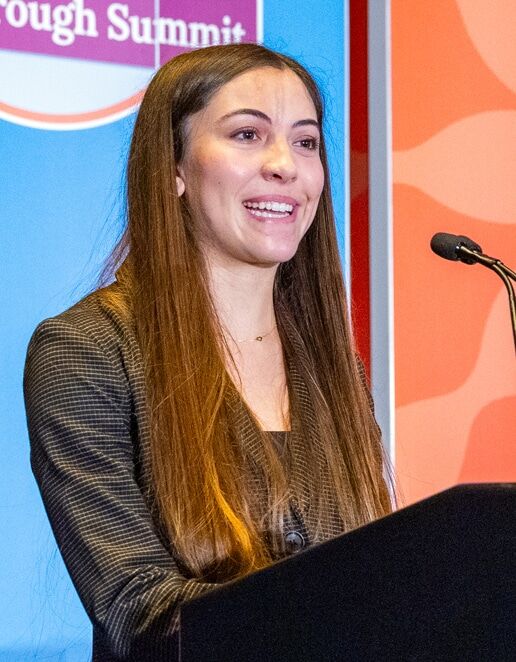
Tanita Allen, a health equity advocate with Huntington’s Disease, described her harrowing story of waiting years for a diagnosis because doctors told her Huntington’s “did not affect Black people.” A stark reminder of how biases of racism and sexism in healthcare continue to extend the diagnostic odyssey for rare patients.
Maria Miller, a fourth-year medical student, shared how her rare disease became manageable thanks to her mother’s quick action in asking a neighbor, a dermatologist, who happened to recall learning about her extremely rare condition in medical school. Maria emphasized that no one should have to rely on coincidence for a diagnosis or luck for treatment. In less than a year, she will be a practicing physician and is committed to identifying and advocating for the “zebras” of the world.
Maria Kefalas, Founder of the Calliope Joy Foundation and Cure MLD, shared words of encouragement from her years of advocacy and her experience losing a child to a rare disease: “Some of the most amazing advocacy comes from bringing meals to a family in the hospital, or just giving testimony to the FDA. You don’t need to save everyone. It is more than enough to do something, anything.”
Regulator Speaker Insights
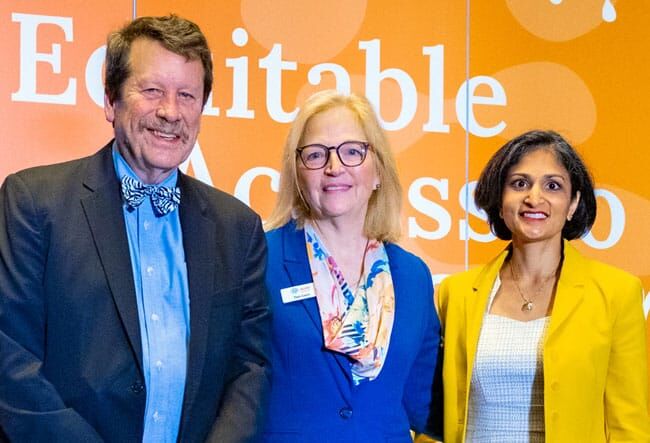
FDA & CMS Fireside Chat
One of this year’s key moments happened on day two, when NORD CEO Pam Gavin led a fireside chat with two of the nation’s top regulatory leaders: Dr. Robert M. Califf, FDA Commissioner, and Dr. Meena Seshamani, Deputy Administrator of the Centers for Medicare and Medicaid Services (CMS) and Director of the Center for Medicare. The three leaders discussed the new FDA Rare Disease Innovation Hub, which aims to concentrate rare disease expertise to make best-informed regulatory decisions, The fireside chat gave a window into how FDA and CMS are increasingly working together to improve and streamline rare treatment development, approval, and access.
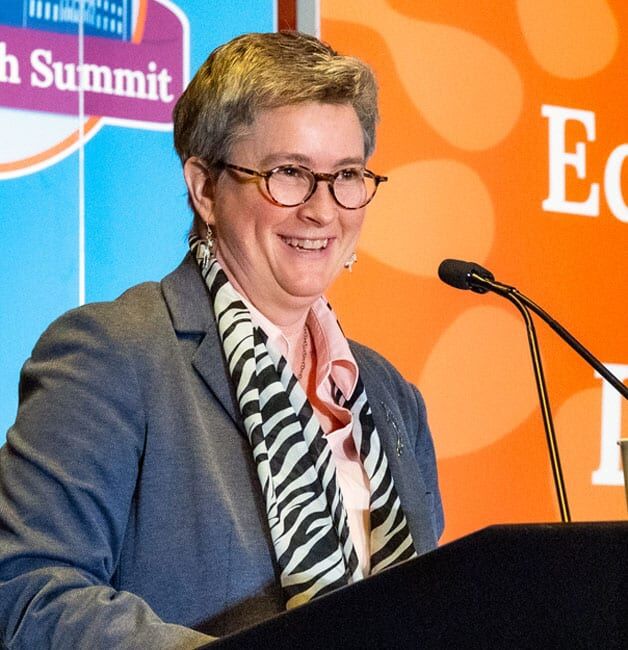
NIH NCATS
We were honored to host Dr. Joni Rutter, Director of the National Center for Advancing Translational Sciences (NCATS) at the National Institutes of Health (NIH), who spoke to a packed audience when she declared: “Equitable access to innovation is a reminder of the responsibility we have to do more than create a cure or treatment.” It is not acceptable, she said, for a patient to finally get a diagnosis only to learn that there is no treatment.
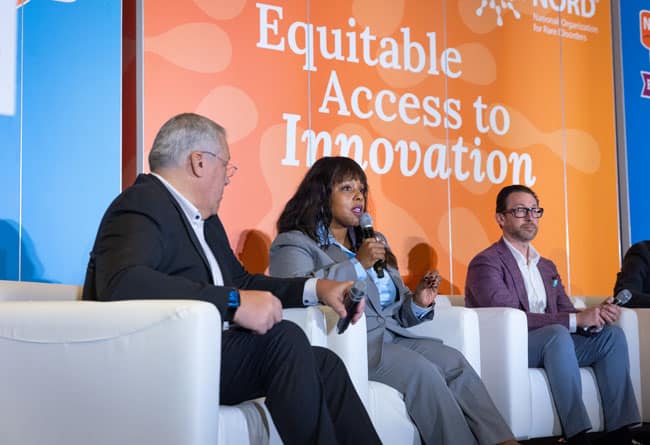
FDA CDRH (Medical Devices)
Dr. Michelle Tarver, Director of the FDA Center for Devices and Radiological Health (CDRH)—the agency responsible for approving medical devices—joined our first-ever panel on medical devices. Dr. Tarver emphasized the importance of patients as leaders in defining needs that could be met by medical devices, noting that working across disease areas has the potential to help multiple patient groups. She also underscored the need to include children much earlier in medical device trials, rather than starting with only adults—a major issue for the rare community.
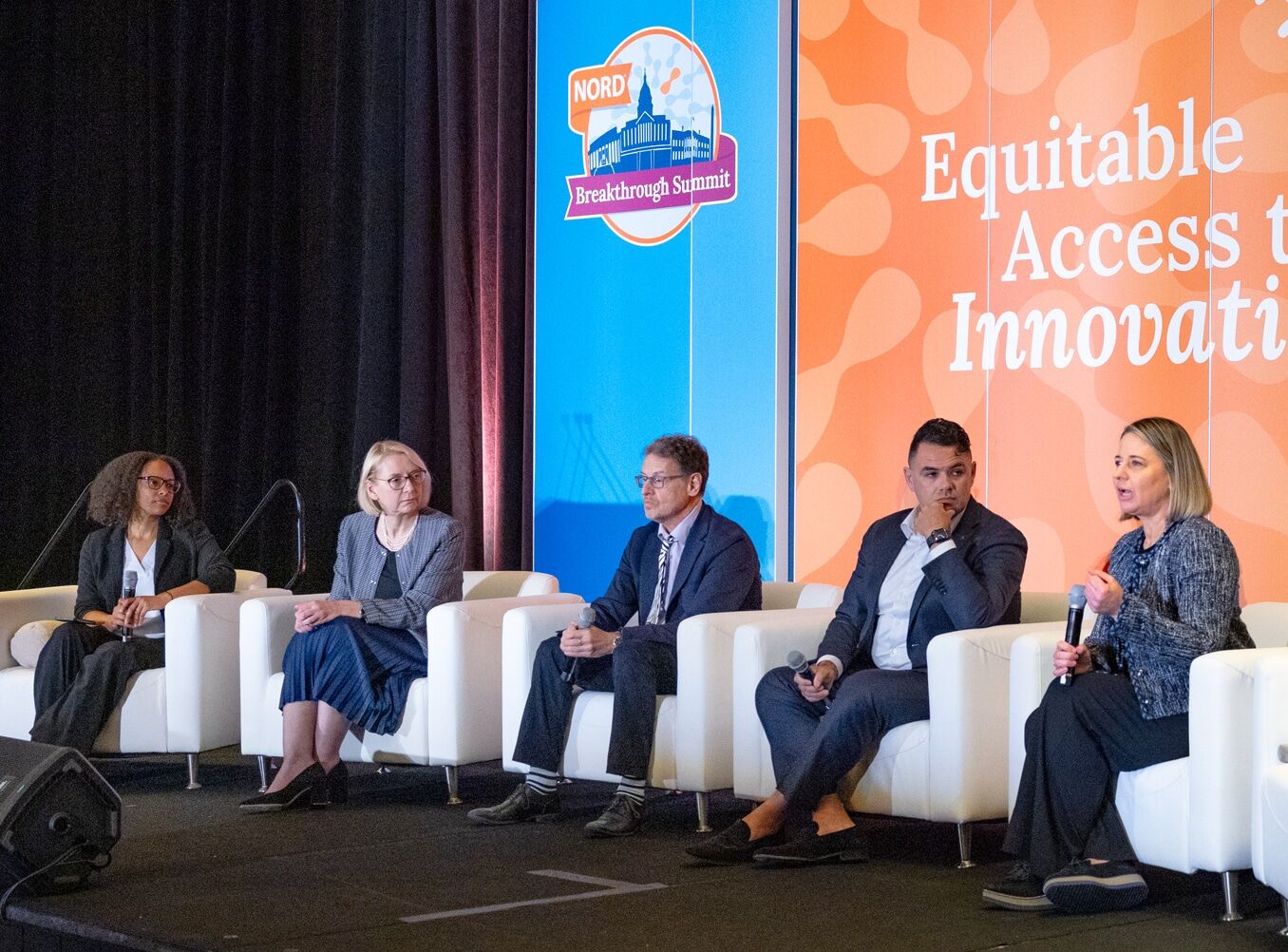
FDA CDER
Dr. Patrizia Cavazzoni, Director of the FDA Center for Drug Evaluation & Research (CDER), and Dr. P.J. Brooks, Deputy Director of the Division of Rare Diseases Research Innovation, NCATS, NIH, joined a panel about enhancing clinical trial success, in which Dr. Cavazzoni referred to patients as “lived experience experts.” They stressed the imperative to cooperate with such experts earlier in the process to ensure endpoints align with patient priority needs.
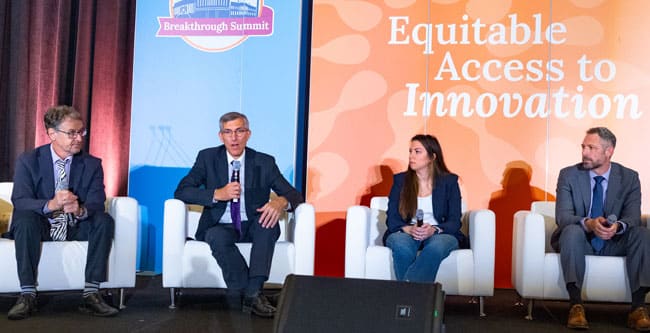
FDA CBER
During a much-watched panel about the accessibility of gene therapy, Dr. Peter Marks, Director of the FDA Center for Biologics Evaluation & Research (CBER), guided us through today’s solutions and tomorrow’s breakthroughs. This included mRNA, guide RNA, AAV (Adeno-associated virus) vectors, and other emerging therapeutic platforms, and ways to give patients access to technologies still in late-stage development.
Biopharma CEO Insights
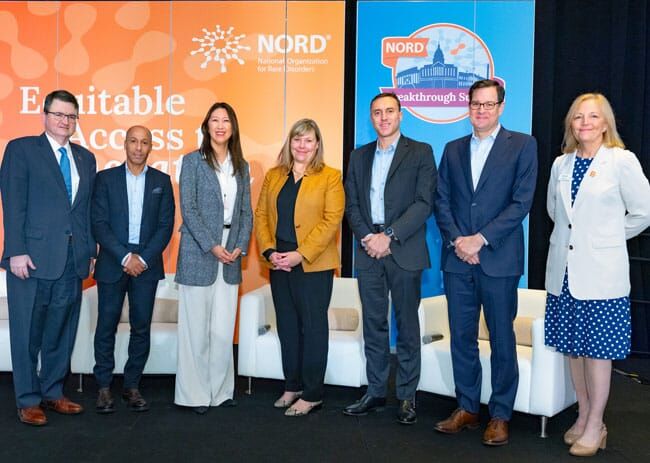
Executives from many biopharmaceutical companies drove home the importance of partnering with patients every step of the way in the drug development process. Nowhere was this more visible than during the CEO Perspectives Panel, our second time hosting this gathering. Participants included:
- Julie Kim, President, U.S. Business Unit and U.S. Country Head, Takeda
- Brian Goff, CEO, Agios Pharmaceuticals
- Rachid Izzar, Executive Vice President, Global Product Strategy & Commercialization, Biogen
- Kate Haviland, President & CEO, Blueprint Medicines
- Giacomo Chiesi, Head of Global Rare Disease and Member of the Board, Chiesi Pharmaceuticals
These industry leaders discussed how affordability factors into companies’ decisions about product development, noting that starting the conversation about reimbursements earlier in the process is key – as in the FDA’s Early Payor Feedback Program for medical devices.
Rare Meetings of Researchers and Advocates
One of the most exciting things about the NORD Summit is the chance to meet in-person to advance shared goals. Some key meetings that took place adjacent to Summit included:
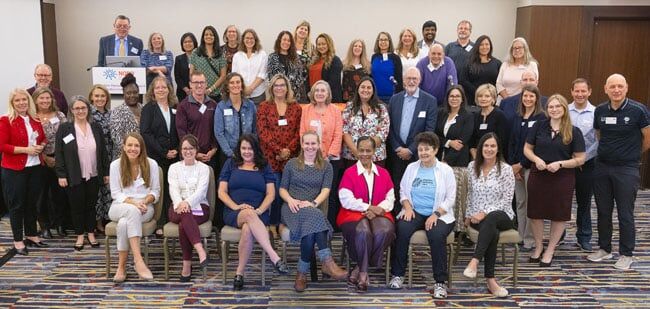
Rare Disease Advisory Councils
Fifty representatives from 25 state Rare Disease Advisory Councils (RDACs) convened to hear from NORD’s policy team and experts on the intricacies of state budget negotiations, how to get the most out of public comment periods, Medicaid policy issues, the impact of Prescription Drug Affordability Boards (PDABs), how to work proactively with the FDA, and improve engagement with their state’s rare disease populations.
As of today, 29 states have passed legislation establishing RDACs to represent their rare disease populations. Find out if your state has an RDAC here. To get involved in efforts to establish a Rare Disease Advisory Council in your state, email [email protected].
.
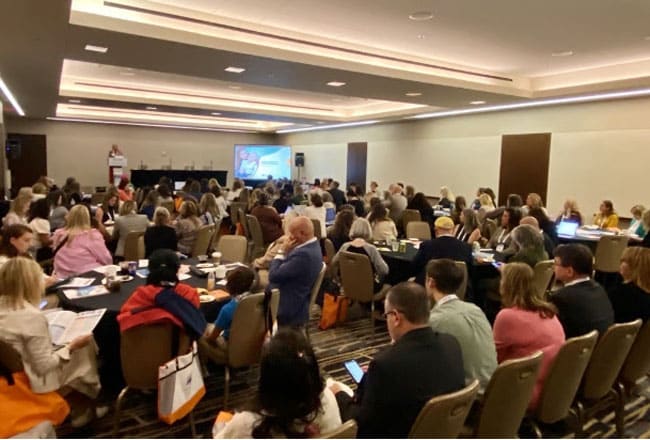
NORD Member Organizations
Leaders from NORD’s Member organizations gathered prior to Summit to learn about developments and initiatives that can help aide their work and communities. NORD CEO Pam Gavin and new Membership Director Alli Ward welcomed them, highlighting how central NORD’s members and the patient communities they represent are to the organization’s mission.
Members were given a sneak peek into new programs and services, including a new member-benefit program to aid patients and caregivers on how to work with health insurance companies.
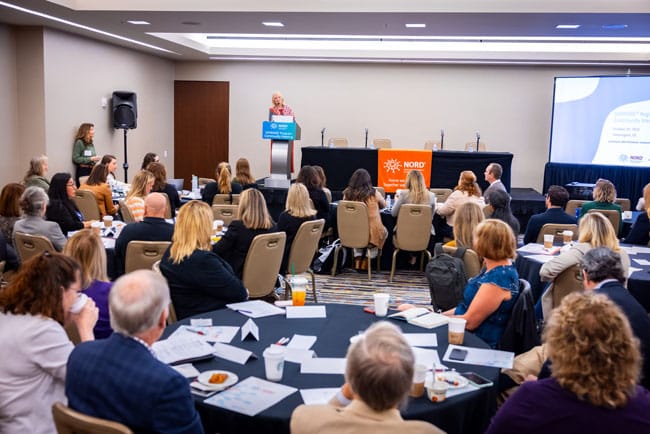
IAMRARE® Research Registries
Leaders of IAMRARE patient registry clients gathered to exchange best practices and learn from one another. They also gained valuable insights on how to reach new patients, leverage health data, and contribute to advancing research and the drug development process for their communities.
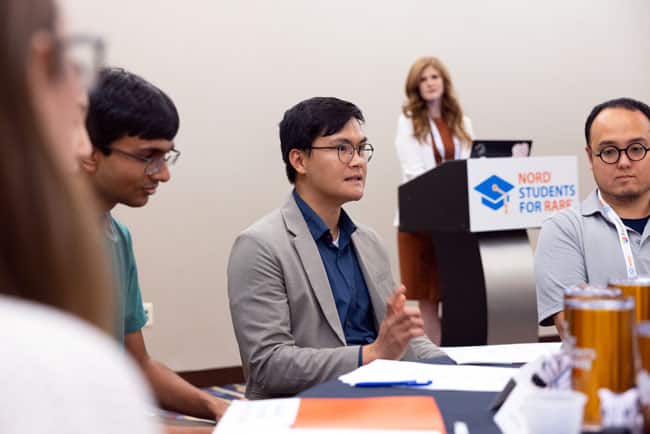
NORD® Students for Rare
NORD Students for Rare—a national network of student-run chapters at medical schools, universities, and high schools committed to rare disease education and awareness—received training and presentations. Topics included new student-led fundraising campaigns, student research grant opportunities, and ways they can work with nonprofit research institutions. Importantly, the students got the chance to attend all Summit sessions, learning side by side with established experts in their fields.
Compelling Research on Display: Poster Hall
Leading researchers and organizations presented findings and solutions at the Poster Exhibit Hall. We are grateful to each of this year’s presenters, many of whom studied for years to attain these findings and traveled far to present them.
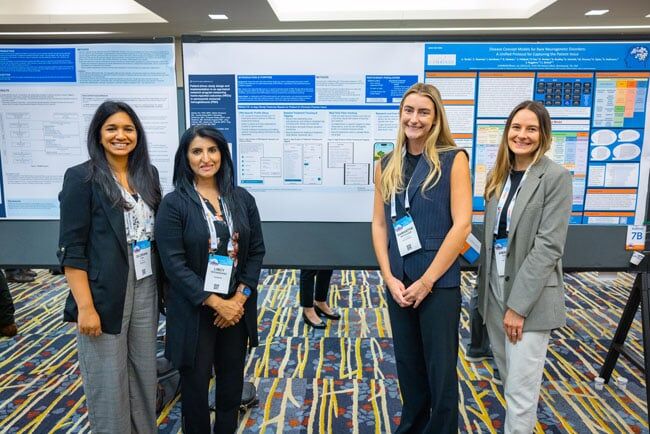
Below is a sampling of a select few standout authors who presented during the main stage Lightning Round Poster Presentations:
“Developing new diversity measures to ensure fair representation in clinical trials,” presented by Kelly McNeil-Posey, RN, MBA, Alexion, AstraZeneca Rare DiseaseResults from the REMADE survey suggest that race and cultural identity are more complex than standard demographic questions currently capture. This is significant because it shows the importance of looking beyond ancestry and more toward self-identity and lived experience when understanding diversity.
“SUmmer in PREcision MEdicine (SUPREME): An Immersive Research Experience in Precision and Genomic Medicine,” presented by Aleksandra Foksinka, MS, University of Alabama at Birmingham (one of 40 NORD Rare Disease Centers of Excellence®)The SUPREME program bridges the gap in rare medical education by providing students with practical experience in rare diseases, giving them a comprehensive understanding from the patient’s perspective of research and clinical applications. The program aims to help the next generation of doctors keep their eyes peeled for zebras, not just horses.
“Tackling Care Deserts in Rett Syndrome: A Multidisciplinary, Multi-phase, Geotargeted Initiative to Bridge the Gap Between Centers of Excellence and Community-based Clinicians,” presented by Katie Kowalski, MPH, National Organization for Rare Disorders (NORD)NORD, the International Rett Syndrome Foundation, and Medlive—NORD’s continuing medical education (CME) partner—investigated the effectiveness of an educational initiative designed to improve early diagnosis of Rett Syndrome, increase awareness of new treatments, and promote team-based care in areas with limited access to Rett Syndrome specialists. As of Summit, 74% of participants were neurologists and about 56 were from identified care deserts. The assessment found there was a marked improvement in pre- and post- knowledge of Rett syndrome, and about 79% of physicians intend to change their clinical practice based on the education.
“The Clinical Burden of Propionic Acidemia in Patients with or without Metabolic Decompensation Events Stratified by Age, in the United States,” presented by Geetanjoli Banerjee, PhD, MPH, ModernaPropionic Acidemia (PA) patients with Metabolic Decompensation Events (MDEs) experience a significantly higher clinical burden than those without MDEs. This study successfully identified this vulnerable subgroup of PA patients and underscored the need for effective therapies to reduce MDEs and chronic PA symptoms. The researchers are hopeful these findings will provide direction for new treatments to be developed.
“The Value of Partnering with a Patient Advocacy Organization in Clinical Trial Recruitment in Sarcoidosis,” presented by Elise Hoover, MPH, Foundation for Sarcoidosis Research (a NORD Member organization)This presentation showed how patient advocacy groups can play a unique role as thought partners and service providers in drug development trials for rare diseases. They demonstrated how their organization’s partnership in sarcoidosis clinical trials resulted in shorter clinical trial durations and, in turn, cost savings.
“Empowering Patient-Funded Research for Rare Cancers at a Community Hospital: A Success Story in Peritoneal Surface Malignancy,” presented by Vladislav Kovalik, MD, MSPH, Mercy Medical CenterDr. Kovalik’s poster was about the importance and impact of patient-funded research, particularly at community hospitals that often struggle to receive grants despite having a high volume of patients and strong clinical capacity in rare cancer. Their case study at Mercy Hospital in Baltimore showed how they grew their team over time into “five principal investigators, three to five research fellows, more than 60 fundraising teams, and a database with more than 700 rare cancer case entries.” Impressively, this team has launched “15 prospective studies, 10 collaborative projects, and published more than 90 manuscripts”—all powered by patients from the community.
Continue the #NORDSummit Conversation
We encourage everyone to check out the #NORDSummit hashtag feeds on X or LinkedIn and view our “Summit 2024” Story Highlight on Instagram.
From all of us at NORD, thank you to all our 2024 attendees, presenters, and sponsors for your participation. We look forward to a fruitful year of collaboration!
Before you go, let us know how we did and how we can do better by completing this brief survey. Once you do that, we invite you to…
Save the Date for Summit 2025!
October 20-21, 2025 @ The Grand Hyatt, Washington D.C.
Do you want to watch recordings of the 2024 NORD Summit sessions? Stay tuned. Recordings will be available next week nordsummit.org to learn how.



